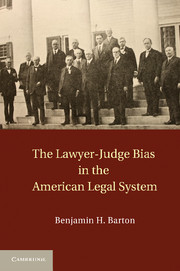Book contents
- Frontmatter
- Contents
- Acknowledgments
- 1 An Ambient Bias
- 2 The Theory
- 3 Constitutional Criminal Procedure
- 4 Civil Constitutional Law
- 5 A Short History of Lawyer Regulation
- 6 Current Lawyer Regulation
- 7 Torts
- 8 Evidence and Civil Procedure
- 9 The Business of Law
- 10 Enron's Sole Survivors
- 11 Complexity and the Lawyer–Judge Bias
- 12 Rays of Hope, Ramifications, and Possible Solutions
- Index
- References
4 - Civil Constitutional Law
Published online by Cambridge University Press: 03 May 2011
- Frontmatter
- Contents
- Acknowledgments
- 1 An Ambient Bias
- 2 The Theory
- 3 Constitutional Criminal Procedure
- 4 Civil Constitutional Law
- 5 A Short History of Lawyer Regulation
- 6 Current Lawyer Regulation
- 7 Torts
- 8 Evidence and Civil Procedure
- 9 The Business of Law
- 10 Enron's Sole Survivors
- 11 Complexity and the Lawyer–Judge Bias
- 12 Rays of Hope, Ramifications, and Possible Solutions
- Index
- References
Summary
Because direct-mail solicitations in the wake of accidents are perceived by the public as intrusive, the Bar argues, the reputation of the legal profession in the eyes of Floridians has suffered commensurately. … We have little trouble crediting the Bar's interest as substantial.
– Florida Bar v. Went For ItBut we have never held that the government itself can shut off the flow of mailings to protect those recipients who might potentially be offended. The First Amendment does not permit the government to prohibit speech as intrusive unless the “captive” audience cannot avoid objectionable speech. Recipients of objectionable mailings, however, may effectively avoid further bombardment of their sensibilities simply by averting their eyes. Consequently, the “short, though regular, journey from mail box to trash can … is an acceptable burden, at least so far as the Constitution is concerned.”
– Bolger v. Youngs Drug ProductsTHE SUPREME COURT IS A UNIQUELY DESIGNED ENTITY within the structure of the American government. Because of lifetime appointment, the power to interpret the law and the Constitution as stated in Marbury v. Madison, and the natural independence of the judiciary, the Court's design has been rightfully hailed as an effort to prevent bias in the judicial function. Nevertheless, even Justices of the Supreme Court have a hard time forgetting their past as lawyers.
- Type
- Chapter
- Information
- The Lawyer-Judge Bias in the American Legal System , pp. 77 - 104Publisher: Cambridge University PressPrint publication year: 2010



